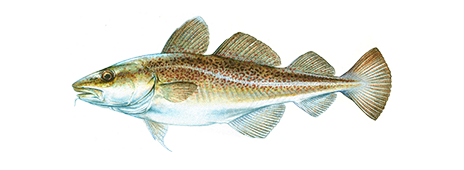Atlantic Cod

A highly sought after food fish, both recreationally and commercially, it would be difficult to overstate the cod’s value.
HOW TO IDENTIFY AN ATLANTIC COD
The cod can be distinguished from other members of its family by the large barbel on the chin and the arch in the lateral line. Like many other members of its family they have three separate dorsal fins and two separate anal fins, none of which contain any spines. The back and sides are highly variable in color (ranging from brownish or sandy to gray, yellow, reddish, greenish, or any combination), and mottled with numerous lighter spots. The belly is white, the lateral line is pale, and all the fins are dark.
Largely omnivorous, they feed on herring, sprat, capelin, sand eels, Irish moss, etc. Many unusual items have also been found in the stomachs of adult cod, including oil cans, a rubber doll, finger rings, clothing, and some very rare deep-sea shells that were previously unknown to science.
WHERE TO CATCH ATLANTIC COD
The Atlantic cod occurs in subarctic and cool temperate waters of the North Atlantic from Greenland to North Carolina, including the Hudson Strait, and from Novaya Zemlya, in the former USSR, to the northern reaches of the Bay of Biscay, including the Baltic and North Seas and Ireland.
The cod can be found in depths of up to 200 fathoms (1200 feet) and prefers rough bottoms composed of sand and rock or of shells. It is a migratory fish but the extent of its migration varies among stocks.
The following list includes additional details on where to catch Atlantic cod:
Coastal Waters Deep Shore Water
Reefs, Wrecks and Shoals Rocky Sea Floor
HOW TO CATCH ATLANTIC COD
Most cod taken by anglers are caught by fishing with live or dead natural baits on the ocean bottom from a drifting or anchored boat, but many are taken by jigging and deep trolling as well. Cod have large mouths, so hook size may vary, but the bait need not be large—a good sized ocean clam will do for almost any size cod. Other good baits include strip baits of squid, fish, crabs, sand eels, and capelin. Artificial lures such as chrome diamond jigs, spinners, bucktails, spoons, and shiny metal squids may also be used.
The following are fishing methods used to catch Atlantic cod:
Drift Fishing Bottom Bouncing
Still Fishing Saltwater Trolling
Saltwater Jigging